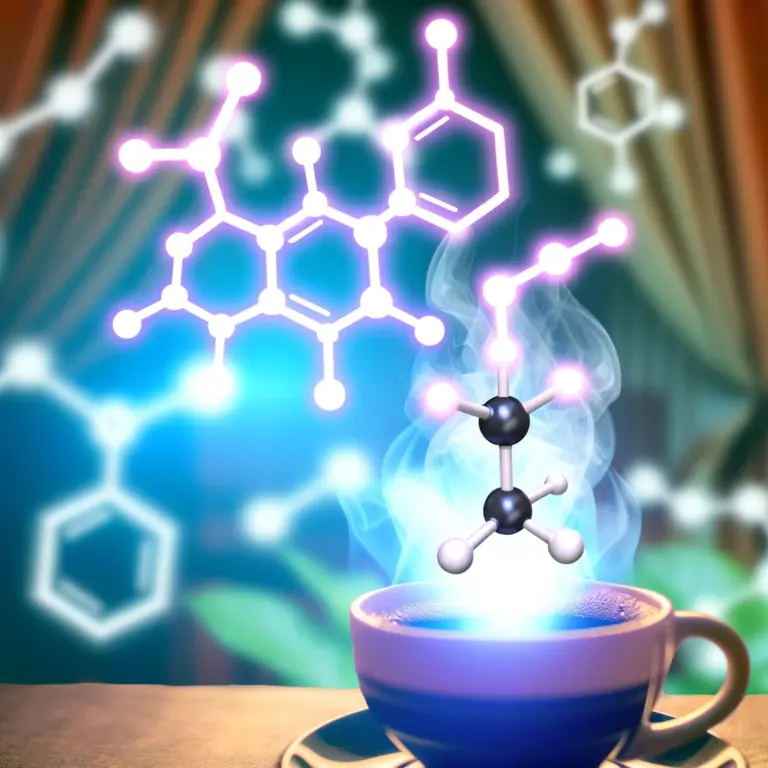Beyond Coffee: Trigonelline’s Surprising Health Benefits Explored
Picture this: your morning cup of joe might be doing more than just kick-starting your day. It could be a secret hero in the realm of health, and I’m not just talking about caffeine! As a nutrition expert who’s been diving deep into the science behind our daily brew for years, I’ve stumbled upon some eye-opening truths that go way beyond the usual buzz.
Trigonelline—a mighty compound nestled within those aromatic beans—is like coffee’s unsung superhero; it morphs into niacin (yeah, good ol’ vitamin B3) as it brews, bringing with it a host of potential perks for our brains and bods.
And guess what? There’s even more to this story you won’t want to miss. Ready for an enlightening sip?.
The Health Benefits of Coffee
Coffee has been linked to a range of health benefits, from its antioxidant content to potential protective effects on the brain. Its role in promoting general well-being and cognition is worth exploring further.
General Benefits
Drinking coffee gives you more than an energy boost. It’s packed with good stuff that can help your body. For instance, trigonelline in those beans isn’t just a perk-me-up—it turns into vitamin B3! That means every sip is like taking a mini-vitamin.
Plus, it’s got antioxidants which fight off damage from bad molecules in our bodies.
A cup of joe could do more for your health than you think. Not only does it have caffeine to wake you up, but also trigonelline which may protect your brain and keep your heart healthy.
This little-known compound is a hidden hero that goes beyond the bean to give us surprising benefits each day we drink up. Now, let’s talk about how this brew can be great for our brains too!
Brain Benefits
Coffee packs a punch for your brain, thanks to all its good stuff. Think about trigonelline – not just any compound, but one with power-up properties for your noggin. It turns into niacin, which is like a high-five for brain cells.
This little change makes sure the coffee you sip on does more than wake you up; it helps keep your mind razor-sharp.
Chugging that morning brew could mean fewer “oops” moments when you forget where the keys are. The antioxidants from trigonelline and friends get busy protecting your neurons, making them less likely to wear out over time.
So each cup isn’t just a tasty treat; it’s like sending in tiny bodyguards to watch over your thoughts and memories!
The Caffeine-Brain Connection
So, we already know coffee can do some good stuff for the brain. But it’s caffeine that really gets things going up there. This little pick-me-up doesn’t just wake you up; it can make your brain work better too.
Caffeine is like a key that unlocks parts of your mind, helping you focus and remember stuff more clearly.
This stuff even has doctors looking twice. They see how caffeine from coffee can help keep the brain strong as we get older. And because of this, drinking a cup now and then might lower the chances of getting big-time memory problems later on in life—how awesome is that? Just imagine—your daily brew could be doing so much more than giving you an energy boost!
The Good Compounds in Coffee
Coffee contains an array of beneficial compounds, including antioxidants and other bioactive compounds that contribute to its health benefits. These compounds play a role in protecting the body against oxidative stress and inflammation.
Antioxidants
Trigonelline, present in coffee beans and fenugreek, is not just about caffeine. It’s a powerhouse of antioxidants. The compound provides a surge of protective benefits with every cup consumed daily.
Trigonelline decomposes into nicotinic acid (Vitamin B3), offering surprising nutritional value, beyond its stimulating effects – it’s more than just a pick-me-up! With potential neuroprotective effects, coffee becomes an unexpected source of antioxidant goodness that supports brain health and overall well-being.
Moving on to “Other Beneficial Compounds”, let’s explore the diverse array of goodies found in your favorite brew!
Other Beneficial Compounds
Coffee contains other beneficial compounds besides trigonelline that contribute to its health benefits. These compounds include antioxidants and alkaloids, which play a significant role in promoting overall wellness. Here are the key beneficial compounds found in coffee:
- Antioxidants: Coffee is rich in antioxidants, such as chlorogenic acid and caffeic acid, which help in protecting the body from damage caused by free radicals and oxidative stress.
- Alkaloids: Coffee also contains alkaloids like kahweol and cafestol, which have been associated with various health benefits, including potential protective effects against certain diseases.
Neuroprotective Effects of Coffee Bioactive Compounds
The neuroprotective effects of coffee bioactive compounds, such as caffeine, chlorogenic acids, caffeic acid, trigonelline, and kahweol and cafestol, have been linked to improved cognitive function and reduced risk of neurological disorders.
These compounds play a crucial role in protecting the brain from damage and supporting overall brain health.
Caffeine
Caffeine, found in coffee and other sources like tea and energy drinks, has various health benefits. It acts as a stimulant for the brain, improving alertness and concentration. Research suggests that caffeine consumption may lower the risk of developing neurodegenerative diseases such as Alzheimer’s and Parkinson’s by offering neuroprotective effects.
Additionally, caffeine intake has been linked to improved cognitive function, including better memory recall and faster information processing. Moreover, it may also contribute to cardiovascular health by reducing the risk of stroke when consumed in moderate amounts.
Caffeine is not just about providing a quick energy boost; it offers surprising health advantages beyond its stimulating effects. Its impact on brain health goes beyond keeping you awake – it plays a role in protecting your brain from age-related decline while enhancing cognitive abilities like memory retention and mental clarity.
Chlorogenic Acids
Moving from the stimulating effects of caffeine, let’s dive into chlorogenic acids found in coffee and their health benefits. Chlorogenic acids are powerful antioxidants present in coffee that can help protect cells from damage caused by free radicals.
These compounds have been linked to various health benefits, including reducing inflammation and improving cardiovascular health. Research suggests that chlorogenic acids may also play a role in regulating blood sugar levels, which is particularly beneficial for individuals at risk of type 2 diabetes.
Furthermore, chlorogenic acids have been associated with potential neuroprotective effects, contributing to brain health. Studies indicate that these compounds may help in preventing age-related cognitive decline and protecting against neurodegenerative diseases like Alzheimer’s and Parkinson’s.
Caffeic Acid
Caffeic acid, found in coffee and some fruits, offers antioxidant properties that can help protect the body from damage caused by free radicals. It’s part of what makes coffee good for you.
This compound also shows potential in lowering inflammation and reducing the risk of chronic diseases like cancer and heart disease. Research suggests that caffeic acid could have neuroprotective effects, which may support brain health and even improve cognitive function over time.
The presence of this compound in coffee adds to its health benefits beyond just providing a morning pick-me-up. Additionally, studies indicate that caffeic acid may play a role in regulating blood sugar levels, holding promise for those at risk of developing type 2 diabetes.
Trigonelline has surprising health benefits beyond just providing caffeine with its potential neuroprotective effects – similarly, caffeic acid contributes to the overall nutritional value of coffee through its antioxidant properties.
Trigonelline
Moving on from the benefits of caffeic acid, let’s delve into the surprising health effects of trigonelline found in coffee. Trigonelline, present in coffee beans and also in fenugreek, offers neuroprotective effects contributing to the overall health benefits of consuming coffee.
Known for its decomposition back to nicotinic acid (niacin or vitamin B3), this compound acts as a rich source of antioxidants, providing protective benefits with just one cup of coffee every day.
Furthermore, research shows that trigonelline’s presence in coffee may reduce the risk of developing type 2 diabetes and liver disease. Its decomposition to nicotinic acid adds nutritional value to coffee beans, offering surprising and scientifically backed health benefits beyond the stimulating effects of caffeine.
Kahweol and Cafestol
Kahweol and cafestol are natural compounds found in coffee that aren’t filtered out by paper filters. They can increase levels of ‘bad’ LDL cholesterol, but some research shows they may have potential health benefits like protecting against certain types of cancer.
These two compounds need to be considered when evaluating the overall impact of coffee on health, especially for those concerned about cholesterol levels. Understanding the effects of kahweol and cafestol is essential when discussing the broader implications of consuming coffee regularly.
Moving on to “The Good Compounds in Coffee”..
Implications for Brain Health
Coffee consumption has been associated with potential benefits for brain health, including a reduced risk of Alzheimer’s and Parkinson’s diseases. The neuroprotective effects of the compounds in coffee may also play a role in preventing stroke and managing epilepsy.
Alzheimer’s and Dementia Prevention
Trigonelline, a compound found in coffee, shows promising potential for preventing Alzheimer’s and dementia. Research suggests that the neuroprotective effects of trigonelline contribute to reducing the risk of developing these cognitive disorders.
Additionally, the presence of antioxidants in trigonelline provides protective benefits that support brain health and may play a role in lowering the risk of Alzheimer’s and dementia.
Moreover, studies indicate that trigonelline’s decomposition into nicotinic acid offers nutritional value and contributes to its overall beneficial impact on cognitive function. This demonstrates how consuming coffee or other sources of trigonelline may have positive implications for long-term brain health by potentially lowering the risk of developing Alzheimer’s disease and dementia.
Parkinson’s Disease Management
Managing Parkinson’s disease can be challenging, but studies suggest that the compounds found in coffee, including trigonelline, might offer some benefits. Research indicates that caffeine and other bioactive compounds present in coffee may help to manage the symptoms of Parkinson’s disease.
These compounds have shown potential neuroprotective effects that could support those with Parkinson’s. Additionally, regular consumption of coffee has been associated with a lower risk of developing Parkinson’s disease.
It is important to note that while there is promising research on how coffee compounds like trigonelline could potentially aid in managing Parkinson’s disease, it is always crucial for individuals to consult their healthcare provider for personalized advice and treatment plans.
Stroke Prevention
Trigonelline, found in coffee beans, offers surprising health benefits beyond just providing caffeine. It contributes to stroke prevention by supporting cardiovascular health and reducing the risk of developing type 2 diabetes and liver disease.
The neuroprotective effects of trigonelline contribute to overall health benefits, making it a valuable component of coffee consumption for maintaining good brain health, which can help prevent strokes.
These findings emphasize the importance of considering trigonelline’s potential when exploring ways to reduce the risk of strokes and maintain overall brain health. Now let’s delve into how coffee consumption can play a role in epilepsy treatment.
Epilepsy Treatment
Trigonelline, found in coffee beans, may offer unexpected benefits for epilepsy treatment. Research suggests that the compound’s neuroprotective effects could play a role in managing epilepsy.
With its presence in coffee, trigonelline provides potential support for those dealing with this neurological condition. Moreover, the decomposition of trigonelline back to nicotinic acid contributes to its overall nutritional value, offering a surprising avenue for exploring complementary approaches to epilepsy management.
The neuroprotective effects of trigonelline and its potential impact on epilepsy imply broader implications beyond just the stimulating effects of caffeine. This finding opens up new possibilities for considering natural compounds like trigonelline as part of an integrated approach to addressing neurological conditions like epilepsy.
Conclusion
In conclusion, it’s clear that coffee offers more than just a morning pick-me-up. Its hidden gem, trigonelline, packs surprising health benefits beyond simply waking us up. From protecting our brain to reducing the risk of certain diseases, this compound found in coffee and fenugreek deserves recognition for its neuroprotective effects.
So next time you savor that cup of joe, remember: you’re not just getting caffeine; you’re also giving your body a dose of unexpected health perks!






